| SHADOWS ON THE WALL | REVIEWS | NEWS | FESTIVAL | AWARDS | Q&A | ABOUT | TALKBACK | |||
| The Little Stranger | |||

| |||
|
dir Lenny Abrahamson scr Lucinda Coxon prd Andrea Calderwood, Gail Egan, Ed Guiney with Domhnall Gleeson, Ruth Wilson, Will Poulter, Charlotte Rampling, Liv Hill, Oliver Zetterstrom, Josh Dylan, Anna Madeley, Kate Phillips, Dixie Egerickx, Tipper Seifert-Cleveland, Camilla Arfwedson release US 31.Aug.18, UK 21.Sep.18 18/Ireland Pathe 1h52  Post-war gloom: Gleeson and Wilson 


|
R E V I E W B Y R I C H C L I N E | ||
 This beautifully crafted period drama works well as a slowly moving creep-out. But for a ghost story it's never scary, and for a love story it's remarkably unromantic. Perhaps director Lenny Abrahamson could have given the character interaction a bit more snap and crackle, beefing up the pace to focus more on the central figure's intense journey. Because as is, the actors are solid but oddly inert.
This beautifully crafted period drama works well as a slowly moving creep-out. But for a ghost story it's never scary, and for a love story it's remarkably unromantic. Perhaps director Lenny Abrahamson could have given the character interaction a bit more snap and crackle, beefing up the pace to focus more on the central figure's intense journey. Because as is, the actors are solid but oddly inert.
In 1948 England, Dr Faraday (Gleeson) is nervous about treating a patient at Hundreds Hall, where his mother worked before he was born. Now in decline, this is the home of the Ayres family: the capable young Caroline (Wilson), her war-injured brother Roderick (Poulter) and their mother (Rampling). Faraday's patient is young maid Betty (Hill), who is terrified of the house itself. And as Faraday returns to treat Roderick and attempt to woo Caroline, he begins to understand what she meant. The ghost of Caroline and Roderick's long-dead sister seems to be a dark menace. Oddly, this ghost story overwhelms the film's more intriguing themes about English post-war society, including the class system, the position of women and the ripples of history, both personally and for a nation. These are clearly the central things running through Coxon's script, and Abrahamson's direction tries to keep them focal as well. But the steadily growing mystery demands attention, and the filmmakers refuse to give into it, which often makes it often feel like the movie has ground to a halt. Gleeson is superb at getting to the core of the character, although Faraday's pinched repression keeps him from being very sympathetic. And the same is true of Wilson's compelling but stubborn Caroline and Poulter's sullen and somewhat manic Roderick. Indeed, each character is self-destructive, so their unhappiness is more due to their decisions than anything that might be lurking in the attic. In smaller roles, Rampling and Hill are also effective at depicting conflicted feelings. More adventurous audiences will enjoy the way Abrahamson and Coxon have adapted Sarah Waters' novel into a textured and unusual film, one that is far more sophisticated than it looks. But this slow-burn approach sacrifices entertainment value, leaving viewers outside looking in rather than experiencing these things firsthand. It also tantalises us with the imagery and ideas of a haunted house movie without ever providing a payoff. The ambiguity is clever and very nicely played, but some emotional catharsis at least would have made the movie linger.
| |||
| R E A D E R R E V I E W S | |||

 Still waiting for your comments ... don't be shy.
Still waiting for your comments ... don't be shy.
| |||
© 2018 by Rich Cline, Shadows on the Wall HOME | REVIEWS | NEWS | FESTIVAL | AWARDS | Q&A | ABOUT | TALKBACK | |||
